-

關於京信通信
全球領先的無線解決方案供應商,為客戶提供廣泛的產品和解決方案
-

關於京信通信
全球領先的無線解決方案供應商,為客戶提供廣泛的產品和解決方案

Today’s venues need to consider multi-operator solutions to satisfy all their visitors, employees and fans, as well as their multiple devices requiring cellular service. Neutral hosts will create new indoor solutions that can evolve from LTE to 5G and provide scalable capacity and coverage solutions for the Enterprise market. While enterprises with a need for a multi-operator indoor network and the solutions they can scale, will first look to Distributed Antenna Systems (DAS) to meet their requirements.
Comba ComFlex PRO DAS Solution saves time and money by delivering multiple operators, bands, and technologies to the remote units all on a single strand of fiber optic cable. It is a highly adaptable solution for extending macro network coverage for 3G, 4G and 5G services providing a unique, full-featured and flexible remote radio head offering.
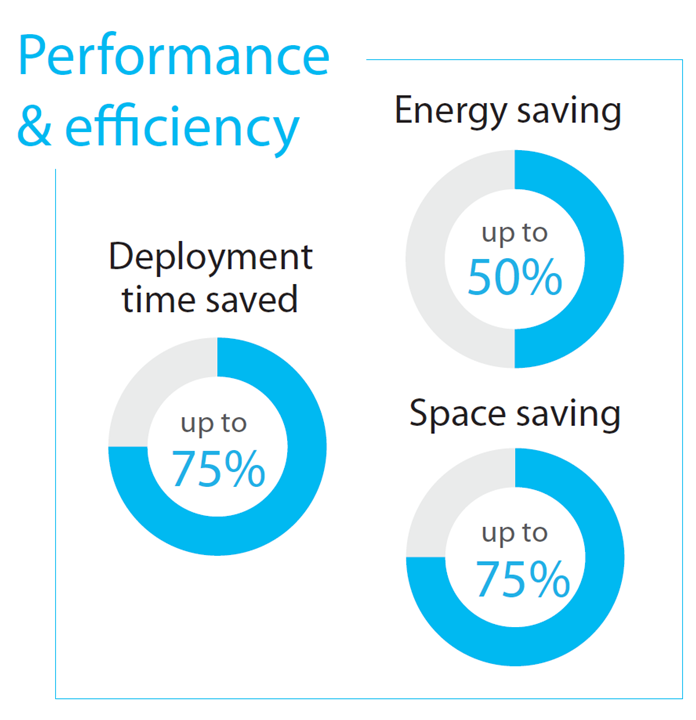
End-to-end solution for a long-term total cost of ownership perspective
ComFlex PRO maximizes the use of existing and future IT cabling infrastructure with full-equipped high power and low power systems of turnkey solution, giving the LTE speed necessary in today’s fast-paced world, at the same time, ensuring a future-proof architecture for 5G with superior features that make it the DAS of choice when considering easy addition of carriers and frequency bands.
It is a power saving and flexible 5G Smart DAS solution that saves rack space, lowers build costs, and allows our customers to tackle challenging environments such as tunnels, underground areas, and high-capacity venues. It accomplishes what the enterprise and the carrier needs.
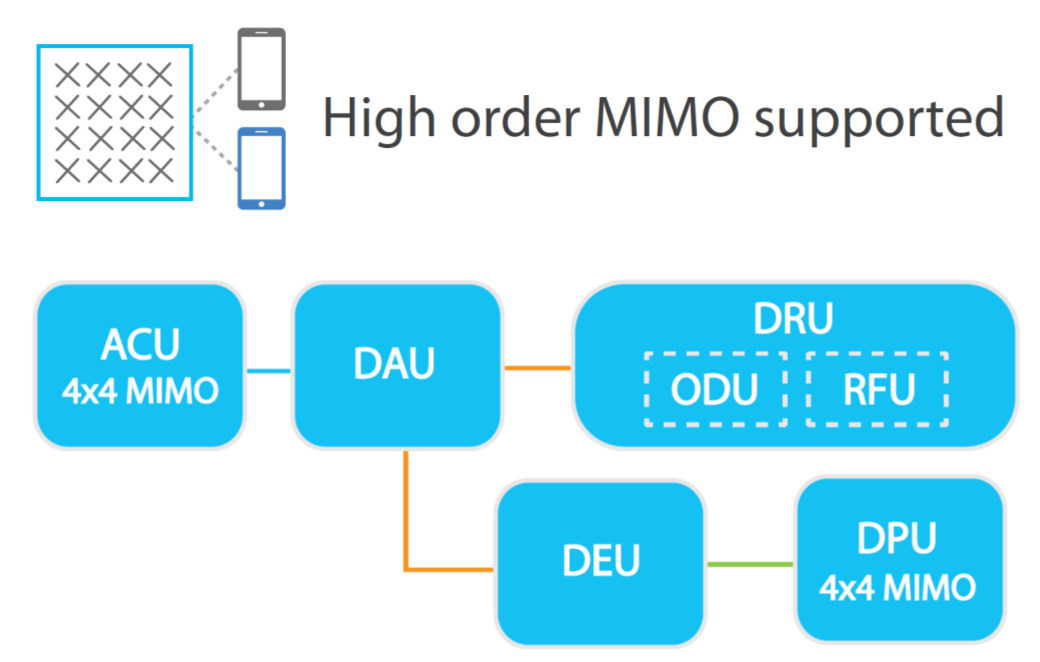
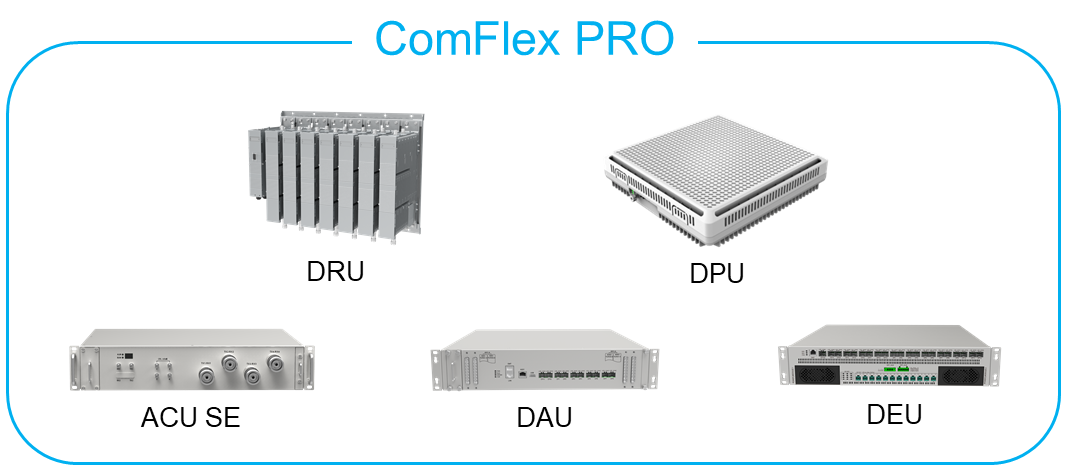

Other Open RAN Solutions
Open RAN architectures utilizing small cells are one deployment scenario that can be particularly well-suited for the private 5G networks. This is because open systems provide a broad range of options for vendors and operators to tailor solutions that best meet individual customer needs. Additionally, maintaining a private network with an open platform is significantly less complex compared to traditional models.
Comba Open Platform Small Cell solution embraces open-platform small cells of a small, low-power, distributed base station system which adopts digital technology and fiber infrastructure, providing 5G indoor coverage signal. It contributes to cost efficient IT infrastructure with on-demand capacity planning using cell splitting without infrastructure modification for rapid deployment.
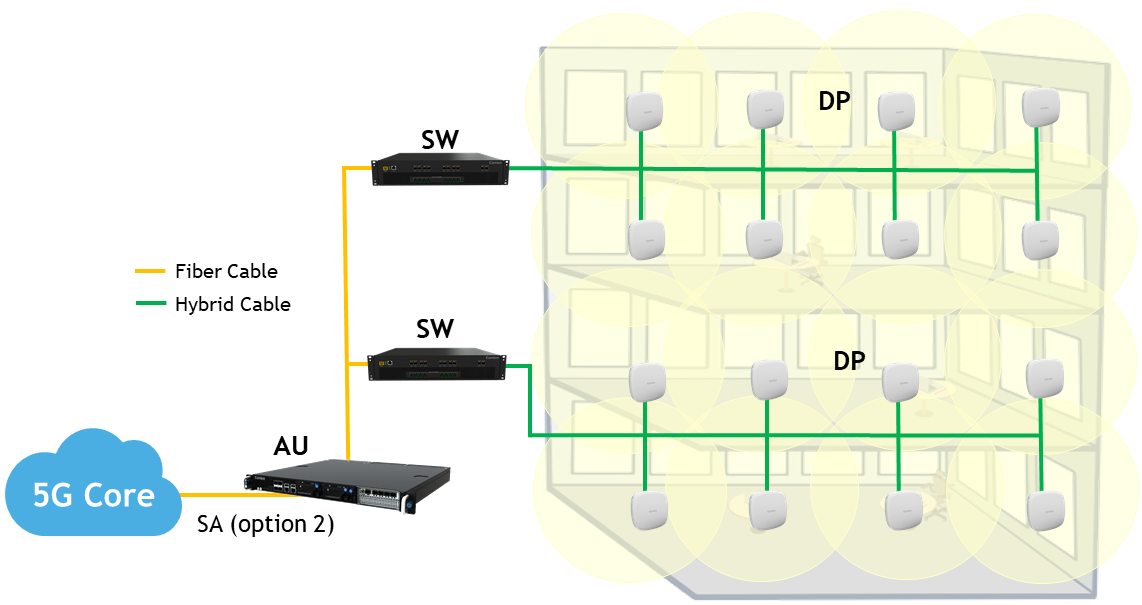
DP (Distributed Unit) connects to SW (Extension Unit) and serves as active cellular signal provision. This lower power transceiver brings high performance for 5G radio indoor distribution coverage.
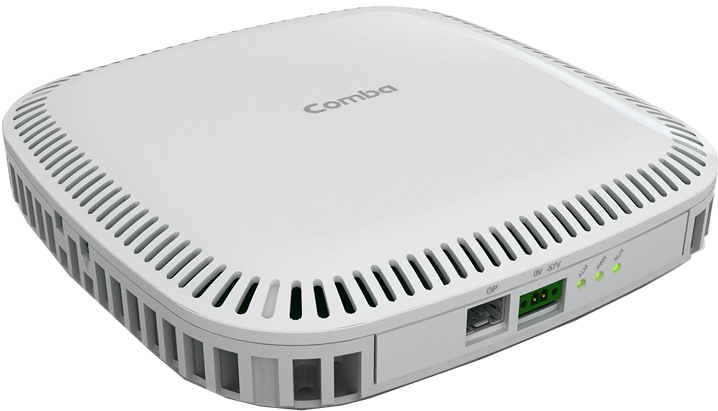
DP
NR N41 and N78
50/ 60/ 80/ 100MHz
SW (Extension Unit) is the data aggregation and forwarding part of Open Platform Small Cell. It can greatly increase the small cell coverage by daisy chain connection. The switch handles data transport, as well as downlink distribution and uplink aggregation.

SW
AU (Access Unit) is the baseband of Open Platform Small Cell solution which connects to core network through IP interface and provides cellular signal for users. The unit directly connects to core network and performs 5G radio physical layer and upper layer protocol processing.

AU
NSA and SA 5G
100MHz
Why small cell is important to Open RAN fragmentation?
Since 5G NR NSA (non Standalone) still uses the existing 4G core, it is very difficult to add 5G equipment from a different supplier from the 4G system, because crucial interfaces like X2 are implemented differently by each vendor. These migration challenges are redoubling operators’ determination to support fully unified interfaces for their next deployments, and the best place to start is often in the relatively greenfield roll-outs of small cells.
Comba Open Platform Small Cell solution is able to accomplish what the enterprise and the carrier needs. It will support multi-vendor interoperability between different components at different layers of the network, reflecting different 3GPP functional splits. As it evolves, it will have the flexibility to support different splits, and so improve the future-proofing of small cell deployments.
Meet our team for more solution information

Ronin Gong
Director of Network Product at Comba Telecom
Enriching indoor wireless communications with 5G open platform small cell

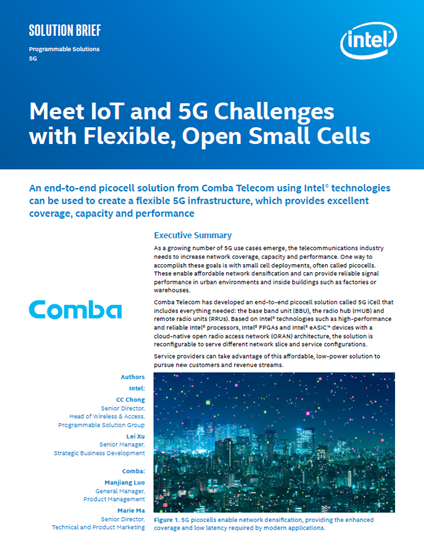
Other Open RAN Solutions
Evolving along with the RAN system, Remote Radio Unit (RRU) technology with support for simultaneous operation of multiple air-interface protocols becomes an emerging end-product requirement. Comba's Open RAN RRU model can address all existing generations of cellular technology, are air-interface agnostic, and support deployment over a wide range of environmental conditions.
Comba's RRH offers high hardware reliability and future-proof Open RAN solution for operators and neutral hosts to reduce total cost of ownership (TCO) with 5Rs:
How can Comba Open RAN solution do it?
Open interfaces to most of the COTS-based BBUs
Comba's RRU is compliant with the O-RAN 7-2x functional split that provides open interfaces to the baseband unit (BBU) and the operation and management (OAM) interface to simplify interoperability between suppliers. It can be easily and quickly interfaced with 3rd party basebands via the industry standard CPRI/ eCPRI interfaces.
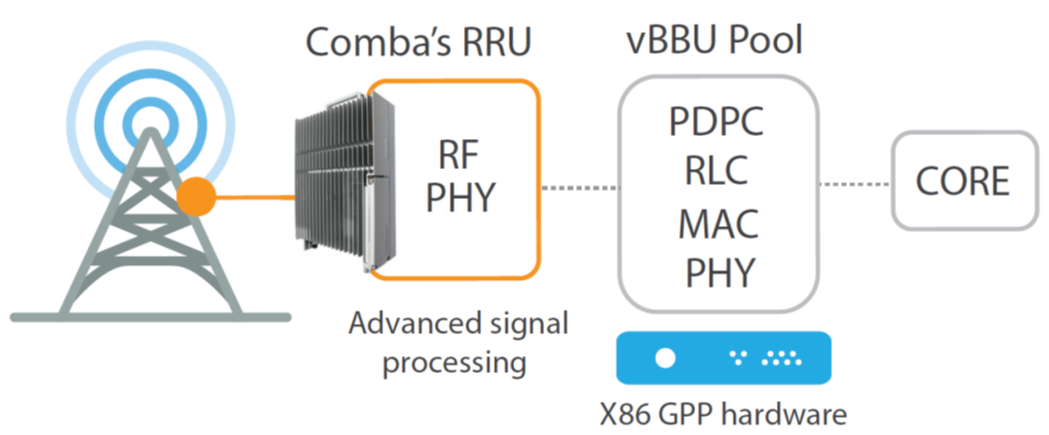
Disaggregation: open Interface not only between BBU and RRU, but also the Layer within the BBU and RRU
Engineered with Multi-TRX radio technology, the RRU allows 4G/5G capacity upgrade to 2T4R, 4T4R or 8T8R for both indoor and outdoor solutions depending on specific band combinations. By increasing network efficiency, capacity and overall speeds, gigabit LTE can make new applications and services practical for consumers.
Lower cost. Higher performance.
Comba's RRU is designed with advanced RF Power Amplifier (PA) protection technology and highly integrated transceiver for cellular base stations, reducing the size, power consumption and cost of the unit.
To minimize the impact from gain and phase ripple, an equalizer with a well-developed and applicable algorithm is equipped in the RRU. It is a digital adaptive filter working in the frequency domain to adjust frequency components, enhancing performance by diminishing cost and complexity of the analog part.
The eCPRI interface in the RRU is compatible with different software vendors, which can ensure the smooth running of multi-vendor interoperating Open RAN 5G network. It can be used for administration, maintenance and troubleshooting of the network. It also transports multiple layer and carries digital radio signal, allowing carriers moving from the baseband units to the radio for simpler deployments of massive MIMO and increased flexibility.
All these enable base station providers to reduce their R&D costs, accelerate time to market, and mitigate the overall technology risk inherent in the development of high power radios.
Meet our team for more solution information

Marie MA
General Manager of Comba Telecom Network Systems Limited
1. Open Ran: catalyzing 5g use case innovations
2. Not just a niche technology – Open RAN has a place in all environments

Jan BERGLUND
Director of Product & Solutions of International Business Development & Marketing at Comba Telecom
How does Open RAN impact the mobile network industry?

Joseph CHU
Product & Solution Manager at Comba Telecom
1. How does fronthaul realize bandwidth saving from split 7-2?
2. Migrating from CPRI to eCPRI
3. Multi-RAT RRU Will be Key for Open RAN Success

Shin Yuan KEE
Assistant Manager, In-building Network Design at Comba Telecom
1. Considering Open RAN for 5G Indoor Deployment
2. How does Open RAN add value in Multi-Operator Sharing?

Kek Seng MUN
Assistant Manager, In-building Design and Technical Marketing at Comba Telecom
1. Private Network: The Hidden Gem
2. What Open Ran means for network infrastructure & 5G?
View Webinars
Multi-RAT Open RAN - Pave the Way to Commercial Open RAN Deployment
Expanding 5G Indoor Connectivity with Open RAN
Macro Open RAN - From Breakthrough to Value Creation
Open RAN Fronthaul Technology Evolution
Open RAN - Bringing Optimization and Innovation
Other Open RAN Solutions